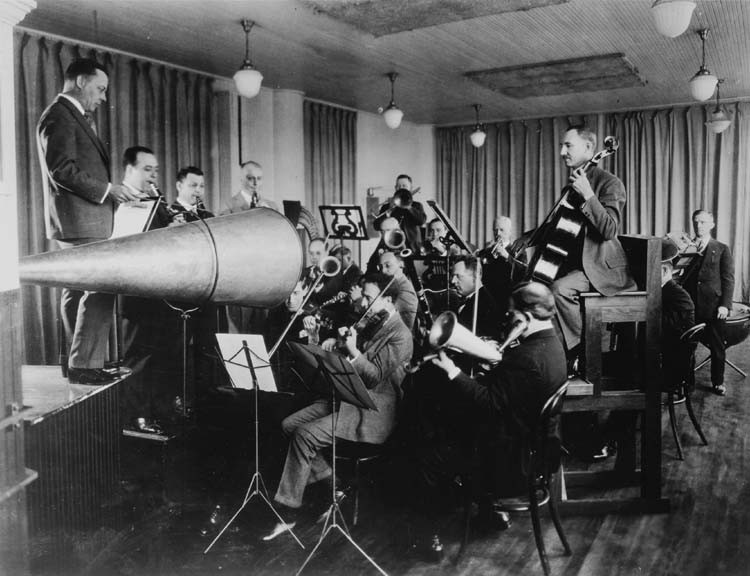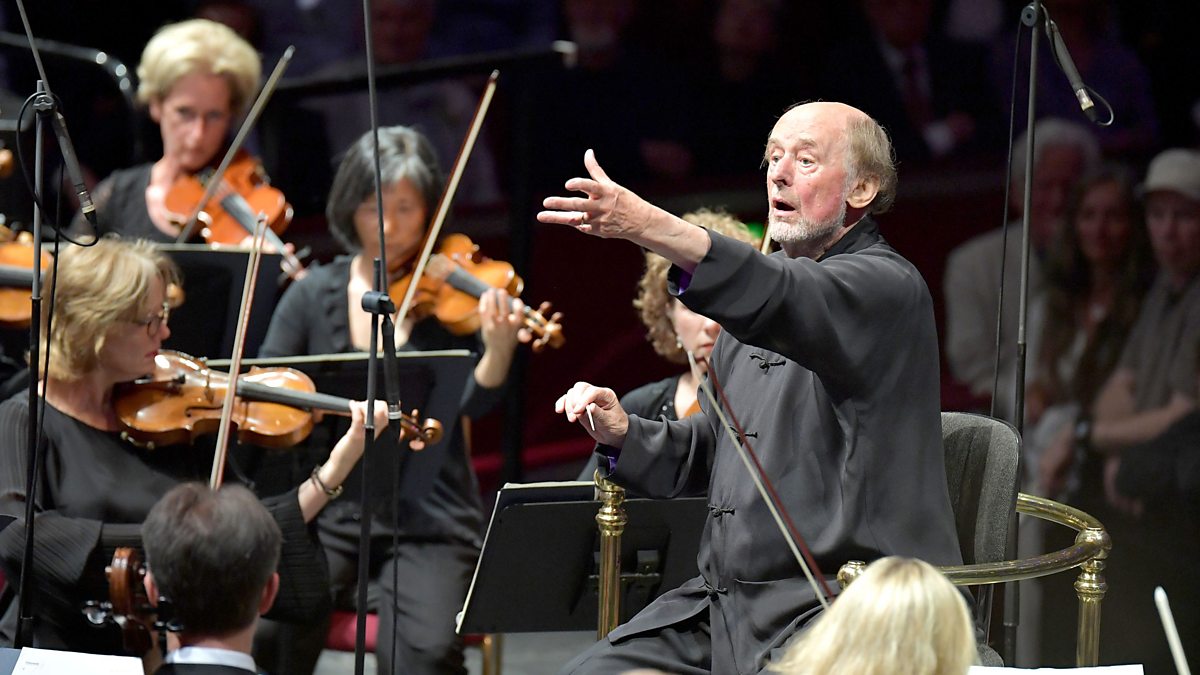Prom 17: 28.07.16 - Roger Norrington conducts Berlioz, Beethoven and Brahms
Collapse
X
-
Prom 17: 28.07.16 - Roger Norrington conducts Berlioz, Beethoven and Brahms
Last edited by Eine Alpensinfonie; 01-08-16, 16:34.Tags: None
-
-
I think I heard, well "half heard" Martin Handley saying this is likely to be an emotional evening for the orchestra. A quick Google shows it is due to merge with SWR Orchestra in 2016. Is this their last concert, or perhaps their last with Norrington? Can anyone add more authoritative information?
(For my money these German radio Symphony Orchestras are pretty damn good and not to be thought of as less than top rank).
-
-
Yes, you heard Martin Handley correctly, as this will be the Stuttgart RSO's final concert before the merger:Originally posted by Cockney Sparrow View PostI think I heard, well "half heard" Martin Handley saying this is likely to be an emotional evening for the orchestra. A quick Google shows it is due to merge with SWR Orchestra in 2016. Is this their last concert, or perhaps their last with Nottingham. Can anyone add more authoritative information?
(For my money these German radio Symphony Orchestras are pretty damn good and not to be thought of as less than top rank).
Rough translation of the text:
"Big stage for the last concert of the Stuttgart Radio Symphony Orchestra: at the legendary BBC Proms, Sir Roger Norrington conducts works by Berlioz, Beethoven and Brahms. Live on SWR2."
Comment
-
-
Originally posted by Cockney Sparrow View PostI think I heard, well "half heard" Martin Handley saying this is likely to be an emotional evening for the orchestra. A quick Google shows it is due to merge with SWR Orchestra in 2016. Is this their last concert, or perhaps their last with Norrington? Can anyone add more authoritative information?
(For my money these German radio Symphony Orchestras are pretty damn good and not to be thought of as less than top rank).
Yes -- these 2 ensembles are, as with all "provincial" orchestras in Germany, of exceptionally high quality, but possessing divergent artistic aims -- SWR Baden-Baden leaning towards contemporary repertoire, & Stuttgart aligned with HIPP -- esp. under Norrington's direction.How this will work out is uncertain....
Comment
-
-
Roger Norrington has made the claim that orchestras played with little or no vibrato until the 1930s.
Why did he say this?
a) Because it’s true?
b) Because he would like it to be true?
c) Because he believes it to be true?
d) Because he has evidence that it’s true?
e) Because it gives credibility to his preferred performance style?
A few months ago, Bryn and I had an exchange of posts on the matter on this forum, expressing different points of view. Perhaps without realising it, Bryn came up with a new Norrington-backing argument. I cited Elgar’s first recording of Carissima, made in 1914, which has all the evidence you need that the string players were using continuous vibrato. Bryn suggested that the players only used vibrato to compensate for the weak sound of acoustic recordings - something I regarded as clutching at straws.
But, unlikely as it seems, could this have been a defining moment? Could it be that this did indeed happen, and the resulting richness of tone pleased conductors and players so much, that they continued to play in this way at other times? It’s a compelling idea. Of course, there are counter-arguments. The number of recording bands/orchestras was very small, so the idea would not have spread quickly. Critics of 90-100 years ago would appear not to have noticed this fundamental change. And it’s convenient that early films of orchestras playing happen to have been made later than this.
Nevertheless, I concede that Bryn may have hit upon the key to the solution.
Comment
-
-
This seems highly implausible to me. It's barely conceivable that musicians would have been able to play continous vibrato entirely off the cuff so convincingly if it weren't already imbued in their technique. There are numerous accounts of string players applying vibrato during the 19th century and either being admonished or praised for this practice (eg Ysaye and his teacher).Originally posted by Eine Alpensinfonie View Post
But, unlikely as it seems, could this have been a defining moment? Could it be that this did indeed happen, and the resulting richness of tone pleased conductors and players so much, that they continued to play in this way at other times? It’s a compelling idea. Of course, there are counter-arguments. The number of recording bands/orchestras was very small, so the idea would not have spread quickly. Critics of 90-100 years ago would appear not to have noticed this fundamental change. And it’s convenient that early films of orchestras playing happen to have been made later than this.
Nevertheless, I concede that Bryn may have hit upon the key to the solution.
Comment
-
-
I think it's implausible too, but I'm looking for a way of explaining a much vaunted claim.Originally posted by Sir Velo View PostThis seems highly implausible to me. It's barely conceivable that musicians would have been able to play continous vibrato entirely off the cuff so convincingly if it weren't already imbued in their technique. There are numerous accounts of string players applying vibrato during the 19th century and either being admonished or praised for this practice (eg Ysaye and his teacher).
Comment
-
-
But this is not the claim being made - "little or no vibrato" (as you can hear in Norrington's performances) means that the continuous and (often) unvaried vibrato that became customary in the Twentieth Century wasn't the norm in earlier performances; instead, vibrato was used with discretion, and at varying degrees within performances as an expressive device.Originally posted by Sir Velo View PostIt's barely conceivable that musicians would have been able to play continuous vibrato entirely off the cuff so convincingly if it weren't already imbued in their technique. There are numerous accounts of string players applying vibrato during the 19th century and either being admonished or praised for this practice (eg Ysaye and his teacher).
Whether early recording studio techniques were responsible for the change to the 20th Century sound, however, I don't know.[FONT=Comic Sans MS][I][B]Numquam Satis![/B][/I][/FONT]
Comment
-
-
Something rather irreverent occurs to me - it might not be a matter of needing to make louder sounds as much as the string players, hearing themselves for the first time as a result of these recordings, used the old fiddlers' trick of splashing the vibrato on all over like Brut 33 in order to cover up inaccurate intonation?Originally posted by ferneyhoughgeliebte View PostWhether early recording studio techniques were responsible for the change to the 20th Century sound, however, I don't know.[FONT=Comic Sans MS][I][B]Numquam Satis![/B][/I][/FONT]
Comment
-
-
Wouldn't a mass simultaneous vibrato by say a violin section result in a kind of shimmer effect, rather than poor intonation? It's difficult to "hear" such a thing in one's head, or for that matter imagine a body of strings all wobbling together in perfect synchronicity!Originally posted by ferneyhoughgeliebte View PostSomething rather irreverent occurs to me - it might not be a matter of needing to make louder sounds as much as the string players, hearing themselves for the first time as a result of these recordings, used the old fiddlers' trick of splashing the vibrato on all over like Brut 33 in order to cover up inaccurate intonation?
Comment
-
-
A full string section using vibrato doesn't normally sound wobbly at all - it just enriches the tone.Originally posted by Serial_Apologist View PostWouldn't a mass simultaneous vibrato by say a violin section result in a kind of shimmer effect, rather than poor intonation? It's difficult to "hear" such a thing in one's head, or for that matter imagine a body of strings all wobbling together in perfect synchronicity!
Comment
-
-
Well, the fact that Ysaye was told off by his teacher for using it all the time, and the use of con vibrato expression marks in scores, for example.Originally posted by Eine Alpensinfonie View PostThe evidence (other than statements of faith)?[FONT=Comic Sans MS][I][B]Numquam Satis![/B][/I][/FONT]
Comment
-
-
But in those earliest recordings, it wasn't a "mass ... violin section" - just a handful of players crammed around a recording horn.Originally posted by Serial_Apologist View PostWouldn't a mass simultaneous vibrato by say a violin section result in a kind of shimmer effect, rather than poor intonation? It's difficult to "hear" such a thing in one's head, or for that matter imagine a body of strings all wobbling together in perfect synchronicity!
 [FONT=Comic Sans MS][I][B]Numquam Satis![/B][/I][/FONT]
[FONT=Comic Sans MS][I][B]Numquam Satis![/B][/I][/FONT]
Comment
-



Comment